- Home
- Paulo Coelho
The Winner Stands Alone Page 16
The Winner Stands Alone Read online
Page 16
4:07 P.M.
The young all have the same dream: to save the world. Some quickly forget this dream, convinced that there are more important things to do, like having a family, earning money, traveling, and learning a foreign language. Others, though, decide that it really is possible to make a difference in society and to shape the world we will hand on to future generations.
They start by choosing their profession: politicians (whose initial impulse always stems from a desire to help their local community), social activists (who believe that the root of all crime lies in class differences), artists (who believe there's no hope at all and that we'll just have to start again from zero)...and policemen.
Savoy had been sure he could be a useful member of society. Having read a great deal of detective fiction, he imagined that once the baddies were all behind bars, the goodies would be able to enjoy their place in the sun forever. He went to police college where he studied assiduously, received excellent marks for his theory exams, prepared himself physically for dangerous situations, and trained as a sharpshooter, although he hoped never to have to kill anyone.
During his first year, he felt that he was learning about the nitty-gritty of the profession. His colleagues complained about low salaries, incompetent judges, other people's preconceived ideas about the job, and the almost complete absence of any real action in their particular area. As time passed, life as a policeman and the complaints continued more or less the same, apart from the addition of one thing: paper.
Endless reports on the where or how or why of a particular incident. A simple case of someone dumping some rubbish, for example, required the rubbish in question to be meticulously searched for evidence of the guilty party's identity (there are always clues, like envelopes or plane tickets), the area then had to be photographed, a map drawn, the perpetrator identified and sent a friendly warning, followed by a rather less friendly warning and, if the transgressor refused to take the matter seriously, by a visit to court, where statements were taken and sentences handed down, all of which, of course, required the services of competent lawyers. Two whole years might pass before the case was finally relegated to the files, with no real consequences for either side.
Murders, on the other hand, were extremely rare. Recent statistics showed that most of the crime in Cannes involved fights between rich kids in expensive nightclubs, break-ins at holiday apartments, traffic offenses, black marketeering, and domestic disputes. He should, of course, be pleased about this. In an ever more troubled world, the South of France was an oasis of peace, even during the Festival when Cannes was invaded by thousands of foreigners visiting the beach or buying and selling films. The previous year, he'd had to deal with four cases of suicide (these involved about fifteen pounds of paperwork) and two violent attacks that had ended in death. And now there had been likely two deaths in a matter of hours. What was going on?
THE BODYGUARDS HAD DISAPPEARED BEFORE they could even give a statement, and Savoy made a mental note to send a written reprimand--as soon as he had time--to the officers in charge of the case. After all, they had let slip the only two witnesses to what had happened, because the woman in the waiting room clearly knew nothing. It took him no time at all to establish that she had been standing some way away when the poison had been administered, and that all she wanted was to take advantage of the situation to get close to a famous film distributor. All he has to do now is to read more paper.
He's sitting in the hospital waiting room with two reports before him. The first, written by the doctor on duty, consists of two pages of boring technical details, analyzing the damage to the organism of the man now in the intensive care unit: poisoning by an unknown substance (currently being studied in the laboratory) and which was injected into the bloodstream through a needle that perforated the left lumbar region. The only agent on the list of poisons capable of provoking such a rapid and violent reaction is strychnine, but this normally sends the body into convulsions. According to the security men in the tent, and as was confirmed both by the paramedics and by the woman in the waiting room, there were no such symptoms. On the contrary, they had noticed an immediate paralysis of the muscles and a stiffening of the chest, and the victim had been able to be carried from the tent without attracting the attention of the other guests.
The second, much longer report was from the EPCTF (European Police Chiefs Task Force) and Europol, who had been following the victim's every move since he set foot on European soil. The agents were taking turns during the surveillance, and, at the time of the incident, the victim was being watched by a black agent originally from Guadeloupe, but who looked Jamaican.
"Even so, the person charged with watching him noticed nothing. Or, rather, at that precise moment, his view was partially blocked by a man walking past holding a glass of pineapple juice."
Although the victim had no police record and was known in the movie world as one of the few revolutionary film distributors around, his business was, in fact, just a front for something far more profitable. According to Europol, Javits Wild had been just another second-rate film producer; then, five years ago, he was recruited by a cartel specializing in the distribution of cocaine in the Americas to help them change dirty money into clean.
"It's starting to get interesting."
For the first time, Savoy feels pleased by what he's reading. He may have an important case on his hands, far removed from the routine of fly-tipping, domestic disputes, holiday apartments being burgled, and those two murders a year.
He knows how these things work. He knows what the report is talking about. Traffickers earn fortunes from selling their products, but because they can't show where that money came from, they can't open bank accounts; buy apartments, cars, or jewels; or transfer large sums of money from one country to another because the government is sure to ask: "How did this guy get to be so rich? Where did he earn all this money?"
To overcome this obstacle, they use a financial mechanism known as money laundering, that is, transforming money earned by criminal means into respectable financial assets which can then become part of the economic system and generate still more money. The expression is said to have originated with the Chicago gangster Al Capone, who bought a chain of laundries known as the Sanitary Cleaning Shops and then used those shops as a front for the money he was earning from the illegal sale of drinks during the Prohibition Era. So if anyone asked him how he came to be so rich, he could always say: "People are washing more clothes than ever. This line of business has turned out to be a really good investment."
"He did everything right," thought Savoy, "apart from forgetting to file a tax return."
Money laundering was used not only for drugs, but for many other things: politicians getting commission on the over-invoicing of construction work, terrorists needing to finance operations in various parts of the world, companies wanting to conceal profits and losses from shareholders, individuals who deem income tax to be an unacceptable invention. Once, all you had to do was open a numbered account in a tax haven, but then governments started drawing up a series of mutual collaboration treaties, and the money launderers had to adapt to these new times.
One thing was certain, however: the criminals were always several steps ahead of the authorities and the tax inspectors.
How does it work now? Well, in a far more elegant, sophisticated, and creative way. They just have to follow three clear stages: placement, layering, and integration. Take several oranges, make some juice, and serve it up--no one need ever suspect where the fruit came from.
Making the orange juice is relatively easy: you set up a series of accounts and start moving small amounts of money from one bank to another, often using computer-generated systems, with the aim of bringing it all together again at some future date. The routes taken are so circuitous that it's almost impossible to follow the traces left by the electronic impulses because, once the money has been deposited, it ceases to be paper and is transformed into digital codes composed of just
two numbers: 0 and 1.
Savoy thinks about his own bank account; the little he has in there is entirely at the mercy of codes traveling up and down wires. What if the bank decided, from one moment to the next, to change the whole system? What if that new program didn't work? How could he prove he had the amount of money he said he had? How could he convert those numbers into something more concrete, like a house or food bought at the supermarket?
He can do nothing because he's in the hands of the system. However, he decides that as soon as he leaves the hospital, he'll visit an ATM and get a balance statement. He makes a note in his diary to do this every week; that way, if some calamity does occur in the world, he'll have proof on paper.
Paper. That word again. How did he get on to this subject in the first place? Ah, yes, money laundering.
He goes back to what he knows about laundering money. The final stage is the easiest of all; the money is put into a respectable account, for example, one belonging to a property development company or an investment fund. If the government asks: "Where did this money come from?" the answer's easy enough: "From small investors who believe in what we're selling." After that, it can be invested in more shares, more land, in planes and other luxury goods, in houses with swimming pools, in credit cards with no cash limit. The partners in these companies are the very same people who first financed the buying of drugs, guns, or some other illicit merchandise. The money, though, is clean; after all, any company can earn millions of dollars speculating on the stock market or on property.
This left only the first step to consider, the most difficult of all: "Who are these small investors?"
And that's where criminal creativity comes in. The "oranges" are people who hang around in casinos using money lent to them by a "friend," in countries where there's corruption aplenty and few restrictions on betting. There's always a chance someone will win a fortune. If they do, there are arrangements in place with the owners, who keep a percentage of the money that crosses their tables. And the gambler--someone on a low income--can justify the enormous sum deposited in his bank account by saying that it was all a matter of luck.
The following day, he'll transfer nearly all the money to the "friend" who lent it to him and hold back just a small percentage.
The preferred method used to be buying up restaurants, which could charge a fortune for their food and deposit the profits in an account without arousing suspicion. Even if an inspector came by and found the tables completely empty, they couldn't prove that no one had eaten there all day. Now, however, with the growth of the leisure industry, a more creative option has opened up. The ever imponderable, arbitrary, incomprehensible art market!
A middle-class couple, say, with little money will bring some extremely valuable piece to auction, alleging that they found it in the attic of their grandparents' old house. The piece is sold for a lot of money, then resold the following week to specialist galleries for ten or twenty times the original price. The "oranges" are happy, thank the gods for their generosity, deposit the money in their joint account, and resolve to invest it in some foreign country, always taking care to leave a small amount--their percentage--in that first account. The gods in this case are the real owners of the paintings who will buy it back from the galleries and put it on the market again, with different vendors this time.
There are, however, more expensive products still, like the theater and the production and distribution of films. That is where the invisible hands of the money launderers can really make a killing.
Savoy is now reading about the man currently in intensive care and trying to fill in a few blanks in his own imagination.
The man had been an actor who dreamed of becoming a major star. He couldn't find any work--although he still took great care of his physical appearance, as if he really were a star--but he got to know the industry. In middle age, he managed to raise some money from investors and make a couple of films, both of which were resounding flops because they didn't get the right distribution. Nevertheless, his name appeared on the credits, and he became known in the specialist magazines as someone who had at least tried to make something different from the films being churned out by the big studios.
Just as he was beginning to despair, unsure what to do with his life, with no one willing to give him another chance, and weary of begging money from people who were only interested in investing in surefire hits, he was approached by a group of people, some of whom were very affable, while others were completely silent.
They made him an offer. He would start up as a film distributor, and his first purchase should be something guaranteed to reach a wider public. The major studios would offer vast sums of money for the film, but he needn't worry--any sum offered would be matched by his new friends. The film would be shown in lots of cinemas and earn a fortune. Javits would get what he most needed--a reputation. No one would be likely to delve into the life of a frustrated film producer. Two or three films later, the authorities might start to ask where all the money was coming from, but by then, the first step was safely concealed behind the five-year time limitation on all tax investigations.
So Javits began a glorious career. His first films as a distributor were highly profitable; exhibitors began to believe in his ability to select the best films on the market; directors and producers were soon queuing up to work with him. To keep up appearances, he always made sure to accept two or three low-budget projects every six months, the rest being films made with megabudgets, top-ranking stars, able technicians, and a lot of money to spend on promotion, money that came from groups based in tax havens. Box-office earnings were deposited in a normal investment fund, above suspicion, which had "shares" in the movie.
Fine. The dirty money was thus transformed into a marvelous work of art, which, naturally, didn't make as much money as was hoped, but was still capable of yielding millions of dollars that would immediately be invested by one of the partners in the enterprise.
At one point, however, a sharp-eyed tax inspector--or perhaps a whistle-blower at one of the studios--noticed one very simple fact: why was it that so many previously unknown producers were employing big stars and the most talented directors, spending a fortune on publicity, and using only one distributor for their films? The answer: the big studios are only interested in their own productions, whereas Javits is the hero, the man standing out against the monopoly of the giant corporations, a David to their Goliath, battling an unfair system.
A more conscientious tax inspector decided to proceed with his investigation, despite all these apparently reasonable explanations. He began in great secrecy and learned that all the companies who had invested in the biggest box-office successes were always limited companies based in the Bahamas, in Panama, or in Singapore. A mole in the tax office (there is always a mole) warned Javits's backers that they had better find another distributor to launder money from now on.
Javits was in despair. He had grown accustomed to the millionaire lifestyle and to being treated as if he were a demigod. He had traveled to Cannes, which provided an excellent front for sorting things out with his backers and personally handing over the codes of various numbered accounts. He had no idea that he was being followed, that a prison term would almost certainly ensue, pending decisions made by men in ties in ill-lit offices. They might let him continue for a while longer, in order to get more proof, or they might end the story right there.
His backers, however, never took unnecessary risks. Their man could be arrested at any moment, make a deal with the court, and give details of how the whole scam worked, as well as naming names and identifying people in photos taken without his knowledge.
There was only one way to solve the problem--they would have to kill him.
Things couldn't be clearer, and Savoy can see exactly how things developed. Now he just needs to do what he always does. Fill in more forms, draw up a report, hand it to Europol, and let their bureaucrats find the murderers because it's a case that could well lead to promotions
and revive stagnant careers. The investigation has to produce a result, and none of his superiors would believe that a detective from a small town in France would be capable of making any major discoveries (because however glitzy and glamorous Cannes was during the Festival, for the other 350 days of the year it was just a small provincial town).
He suspects that the perpetrator may have been one of the bodyguards at the table, since the poison could only have been administered by someone standing very close. However, he won't mention that. He'll fill up more paper about the people working in the tent, find no further witnesses, then close the file--having first spent a few days exchanging faxes and e-mails with other more important departments.
He'll go back to his two murders a year, to the fights and the fines, having been so close to something that could have international repercussions. His adolescent dream of improving the world; contributing to creating a safer, fairer society; getting promoted; landing a job at the Ministry of Justice; giving his wife and children a more comfortable life; helping to change the public perception of the law; and showing that there are still some honest policemen, all came down to the same thing--more paperwork.
4:16 P.M.
The terrace outside the bar is packed, and Igor feels proud of his ability to plan things, because even though he's never been to Cannes before, he had foreseen precisely this situation and reserved a table. He orders tea and toast, lights a cigarette, and looks around him at the same scene you might see in any chic place anywhere in the world: women who are either anorexic or use too much Botox; ladies dripping with jewelry and eating ice cream; men with much younger female companions; bored couples; smiling young women sipping low-calorie drinks and pretending to be listening to what their friends are saying when they're really on the lookout for someone more interesting to hove into view.
There is one exception: three men and a woman are sitting at a table strewn with papers and beer cans, discussing something in low voices and constantly checking figures on a calculator. They appear to be the only ones who are really engaged in some project, but that isn't quite true; everyone there is working hard in a way, in search of one thing: vis-i-bil-i-ty, which, if all goes well, will turn into Fame, which, if all goes well again, will turn into Power, the magic word that transforms any human being into a demigod, a remote, inaccessible icon accustomed to having his every desire met and to getting jealous looks when he sweeps past in his limousine with the smoked-glass windows or in his expensive sports car, someone who no longer has mountains to climb or impossible conquests to make.

 The Alchemist
The Alchemist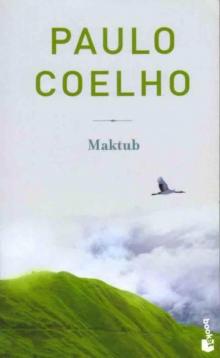 Maktub
Maktub Like the Flowing River
Like the Flowing River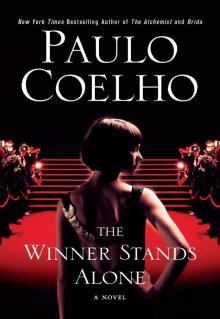 The Winner Stands Alone
The Winner Stands Alone The Spy
The Spy By the River Piedra I Sat Down and Wept: A Novel of Forgiveness
By the River Piedra I Sat Down and Wept: A Novel of Forgiveness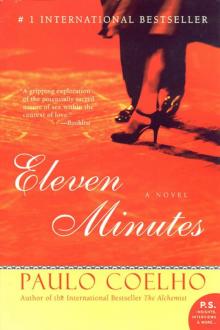 Eleven Minutes
Eleven Minutes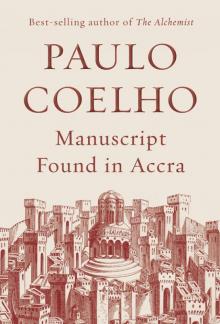 Manuscript Found in Accra
Manuscript Found in Accra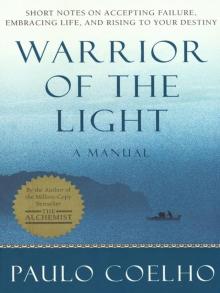 Warrior of the Light
Warrior of the Light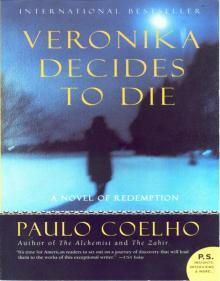 Veronika Decides to Die: A Novel of Redemption
Veronika Decides to Die: A Novel of Redemption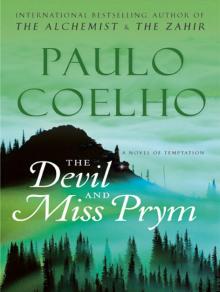 The Devil and Miss Prym: A Novel of Temptation
The Devil and Miss Prym: A Novel of Temptation The Valkyries: An Encounter With Angels
The Valkyries: An Encounter With Angels Brida: A Novel
Brida: A Novel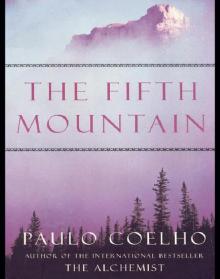 Fifth Mountain: A Novel
Fifth Mountain: A Novel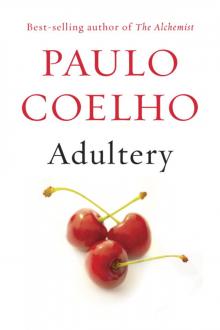 Adultery
Adultery Inspirations
Inspirations The Archer
The Archer The Witch of Portobello
The Witch of Portobello The Pilgrimage
The Pilgrimage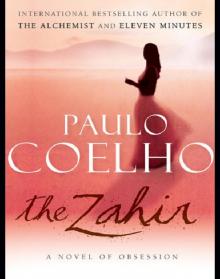 The Zahir
The Zahir Brida
Brida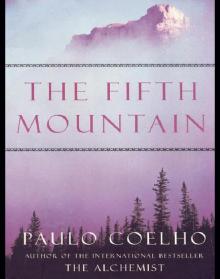 The Fifth Mountain
The Fifth Mountain Like the Flowing River: Thoughts and Reflections
Like the Flowing River: Thoughts and Reflections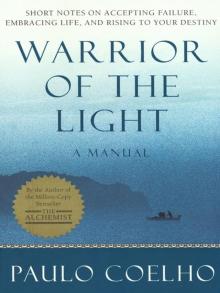 Manual of the Warrior of Light
Manual of the Warrior of Light By The River Piedra I Sat Down & Wept
By The River Piedra I Sat Down & Wept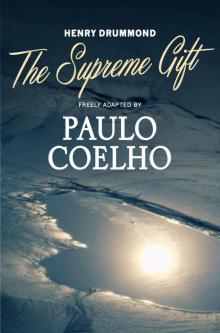 The Supreme Gift
The Supreme Gift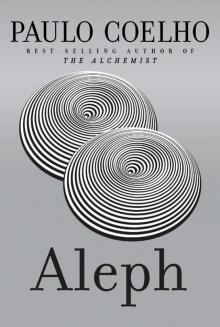 Aleph
Aleph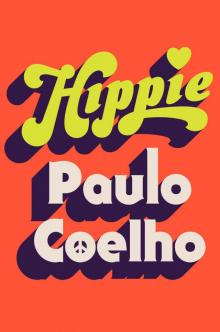 Hippie
Hippie Witch of Portobello
Witch of Portobello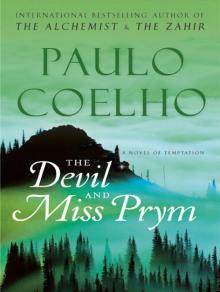 The Devil and Miss Prym
The Devil and Miss Prym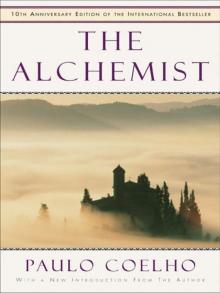 The Alchemist - 10th Anniversary Edition
The Alchemist - 10th Anniversary Edition The Valkyries
The Valkyries